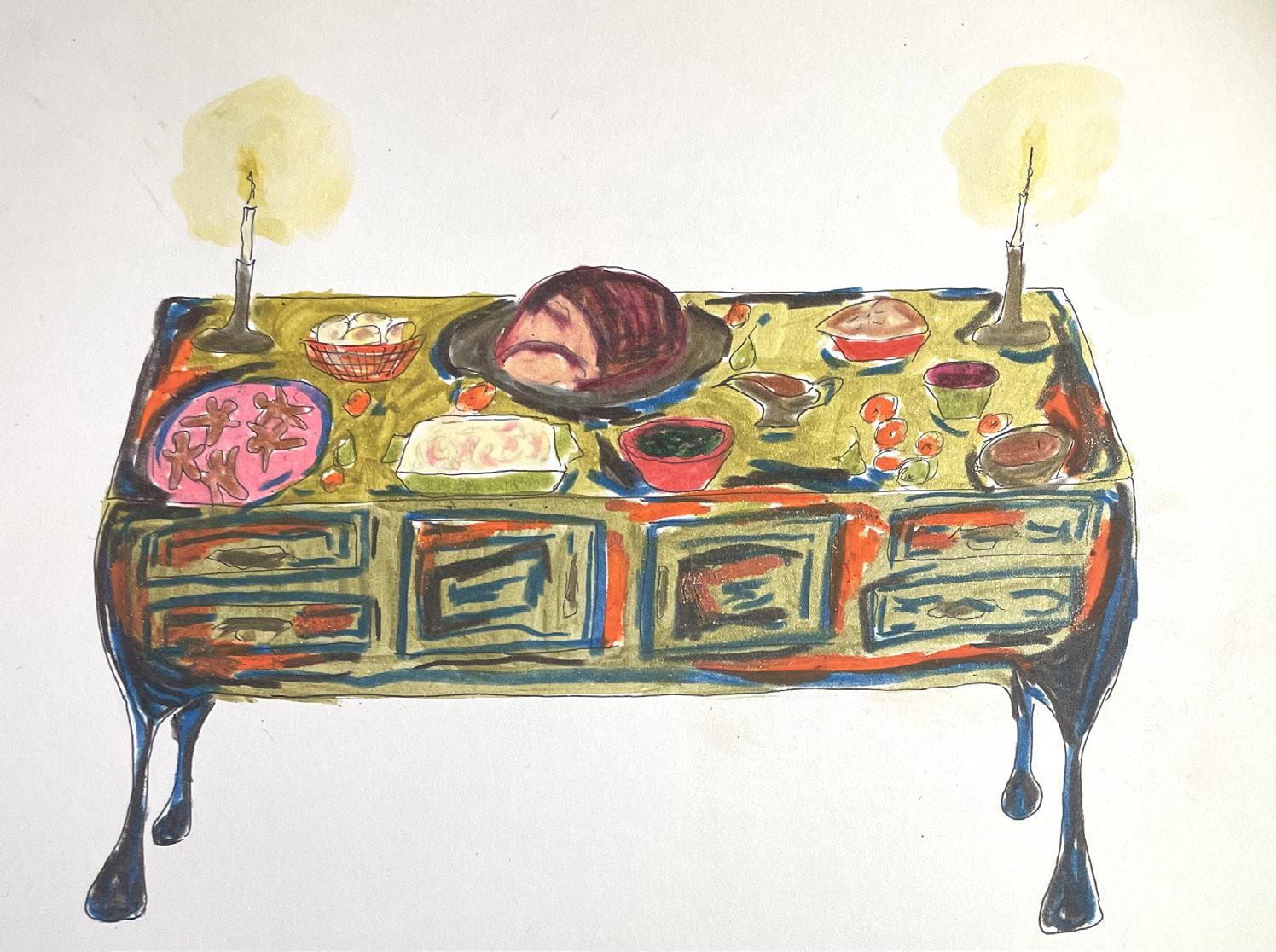
4 minute read
Eat Happily: Guilt-Free Holiday Feasting
Eat Happily: Eat Happily: Eat Happily: Eat Happily: Guilt-Free Guilt-Free Guilt-Free Guilt-Free Holiday Feasting Holiday Feasting Holiday Feasting Holiday Feasting
The holidays are o en a time of year that are, in large part, celebrated by expressing love to friends and family. However, while we focus on showing a ection towards others, we o en forget to show love towards ourselves. Speci cally, the holiday season is when we are harshest on our own bodies and how we are fueling them. Many of the traditions this time of year consist of food: cooking, baking, recipes, dinners, etc. e annual anksgiving dinner, for example, is personally one of those times when I wish I could never feel full. However, the initial joy I feel from the extensive food options is o en encroached by a feeling of shame or regret for the amount of food I have just consumed. In a society where what we eat is constantly associated with how our bodies appear, it becomes increasingly di cult to separate eating from body image during a supposedly joyful time of year. It is easy to be hypercritical and to keep ourselves accountable for our food consumption that it can become overwhelming, leading us to be unnecessarily harsh to ourselves on occasions when we should be enjoying ourselves. While one of the holiday’s most signi cant attributes is family, our families can be even more guilt-inciting than ourselves in regards to eating and body image. In talking to Ejen, BC ’24, I learned that for her, simply hearing loved ones talk about their own eating habits can make her feel uncomfortable. She explained that “Sometimes it’s them talking about what they’re eating that makes me feel self-conscious as well. If they’re eating something and say ‘oh I shouldn’t be eating this,’ and I’m eating twice as much, then I feel like I shouldn’t be eating as much.” We tend to constantly compare ourselves to others in every aspect of our lives. Eating habits, though, should be an individual part of our lives and adjusted to our own needs. During this time of year when comparing one’s eating habits to those of a loved one can be at an all-time high, it is important to remember that our bodies are all di erent and thus necessitate di erent kinds and amounts of food. Comparing our own food consumption to that of others is, therefore, a futile process given the fact that what is best for each individual varies. Family can also be tough to be around with the comments they make on our own eating. Parents may o en feel they must let us know their opinions on every aspect of our lives, which may have unintended consequences. Let me set the scene: You sit down for anksgiving dinner with your family, excited for the mouthwatering food waiting on the table. As the meal progresses, you get
Advertisement
by Romane Lavandier
Art by Grace Meinzer
seconds and then thirds. As you serve yourself the third time, your parents make a comment about how much you have already eaten. ere is now a small voice in your head telling you that you should stop eating, making it di cult to enjoy the rest of the meal. Comments like these that make us feel ashamed of our eating habits can have a deep impact on our mindset regarding food when coming from family members whose opinions we value. Luckily, over the years I have become better at not feeling ashamed even with comments like these. I have begun to accept that there are some things I will just never agree on with my parents, and how I feel about my eating habits and my body is one of them. Sometimes, it is necessary to exit certain counterproductive conversations. If a discussion with a loved one is making you feel guilty about your eating habits or is leading to insecurities regarding your body, it is perfectly acceptable to leave those discussions. I can tell you that I have personally le the dinner table to exit a conversation that was making me feel guilty about my food choices, and it was the best possible decision at that moment. is holiday season, if a family member is making you feel guilty for your eating habits, I encourage you to end the discussion or start a new topic of conversation in order to protect yourself and your body image. ese insecurities and feelings of regret can easily take away the fun and joy during this time of the year. My discussion with Ejen, though, o ered a new mindset on the issue that I believe can help everyone as we enter the holiday season. She explained the following: “I focus on appreciating and being grateful to be able to be with my family and my friends and to have that much food, which is not something I want to take for granted. When I frame it like that, it’s less about myself and feeling anxious about my body, and it’s more about enjoying the experience. If I’m too busy thinking about my food, I can’t appreciate the time that I’m spending with my family during the holiday so it’s not worth it.” All in all, the holidays are primarily to enjoy oneself in the company of loved ones. e food is simply an added festivity. So why are we giving it the power to negatively overwhelm our thoughts? is year, I encourage all of us to focus on appreciating and showing a ection toward not only our loved ones, but also ourselves and our bodies.










